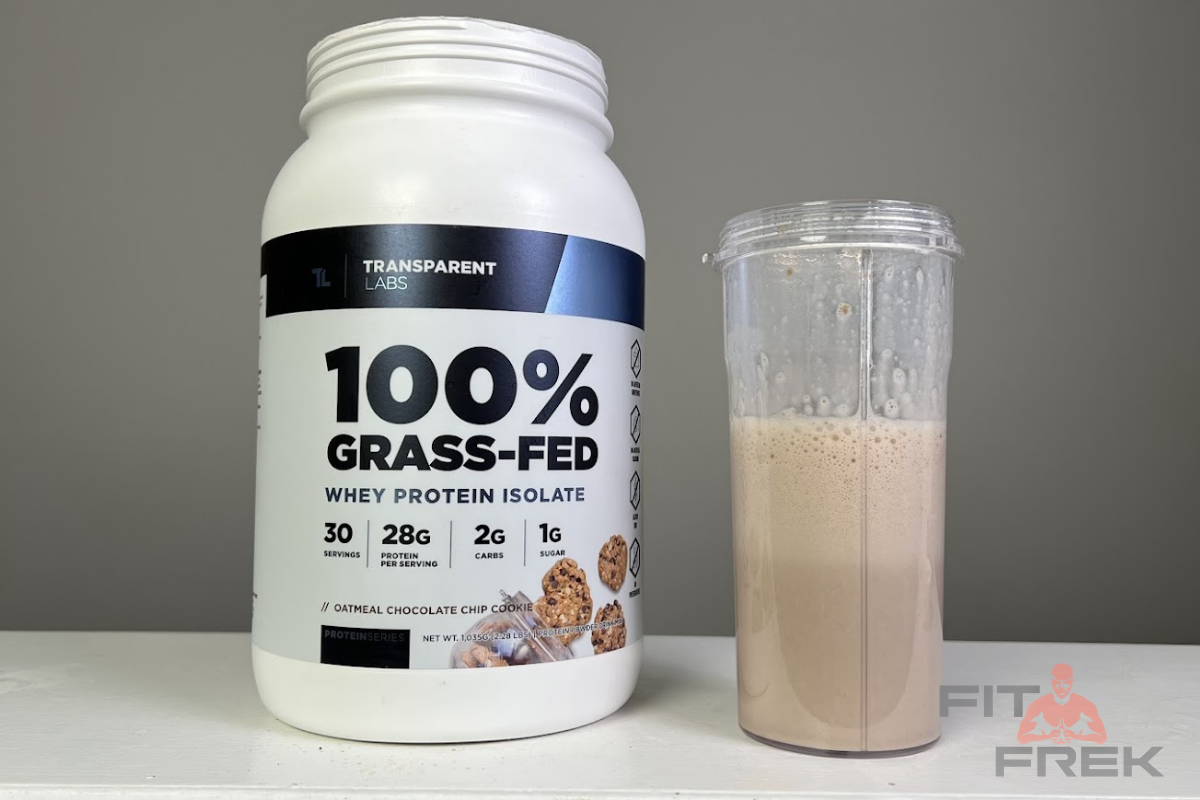
If you care about your health, then you'll probably want the cleanest source of supplements.
When it comes to protein, there are quite a few different categories.

But one that's compared a lot is whey vs grass-fed protein.
For bodybuilders, protein is a big deal.
But not all proteins are created equal.
Enter the world of whey protein.
And we're not just talking about regular whey protein.
We're diving into grass-fed whey protein and how it stacks up against regular whey protein.
So here's the difference between regular and grass-fed whey:
The Basics: Whey protein is a byproduct of cheese production. It's packed with all the essential amino acids your body needs but can't produce independently. That's why it's a hit with fitness folks.
The Contenders: Regular whey comes from cows that are often fed a diet of grains. Grass-fed whey, on the other hand, comes from cows that have grazed on grass for most of their lives.
The Nutritional Knockout: Grass-fed whey often packs more Omega-3 fatty acids, CLA, and vitamins than regular whey. Why? It's all about the diet of the cows.

Whey protein.
You've probably heard it hundreds of times in the gym.
But what is it, really?
Whey is a by-product of cheese production.
When milk is turned into cheese, whey is what's left behind.
It's a liquid that's packed with protein, making it a goldmine for anyone looking to build muscle or enhance recovery.
But not all whey proteins are created equal.
(Read: Transparent Labs Grass-Fed Protein Review)
There's your regular whey, and then there's grass-fed whey.
We'll get into that later.

So, how do we get from liquid whey to the protein powder that you mix into your -shake?
It's a process.
First, the liquid whey is pasteurized.
Then, it's dried into a powder.
But here's where things get interesting.
There are different types of whey protein: concentrate, isolate, and hydrolysate.
The concentrate is the least processed form, with a lower protein content but more of the other nutrients from the original whey.
Isolate is more processed to remove fat and lactose, leaving behind a higher protein content.
Hydrolysate is pre-digested, making it the fastest to absorb.
Each has its pros and cons, depending on your goals and dietary needs.

Why all the fuss about whey protein?
Well, it's got a lot going for it.
For starters, it's a complete protein.
That means it contains all nine essential amino acids that your body can't make on its own.
It's also rich in leucine, a branched-chain amino acid that's key for muscle building.
But the benefits of whey protein go beyond muscle.
It can support your immune system, improve gut health, and even boost levels of glutathione, a powerful antioxidant.
It's no wonder athletes and health-conscious folks alike swear by it.

You've got the lowdown on whey protein.
But what's the deal with grass-fed whey?
Grass-fed whey comes from cows that have been fed a diet of, you guessed it, grass.
This is in contrast to regular whey, which comes from cows that are often fed a diet of grains.
Why does this matter?
Well, the diet of the cow can influence the nutritional profile of the whey.
While both types of whey protein can support your fitness goals, there are some differences to take note of.
Let's break it down:
But remember, these differences are relatively small. The choice between grass-fed and regular whey will ultimately depend on your personal preferences, dietary needs, and budget.
Let's break down what research has found:
These studies show that muscle protein has benefits, and that grass-fed whey also potentially has a little edge over regular whey protein.

How much grass-fed whey protein should I take?
The amount of grass-fed whey protein you should take depends on your individual protein needs, which can vary based on weight, activity level, and fitness goals. As a general guideline, consuming 0.8 grams of protein per kilogram of body weight for sedentary adults and up to 2.0 grams per kilogram for those involved in intense physical activity is recommended.
Can I take grass-fed whey protein if I have a milk allergy?
Whey protein is derived from milk and can contain lactose, so it's not recommended for those with a milk allergy or severe lactose intolerance. If you have mild lactose intolerance, you may be able to tolerate whey protein isolate, which has most of the lactose removed.
Does grass-fed whey protein taste different from regular whey protein?
While taste can vary between brands and individual preferences, some people find that grass-fed whey protein has a slightly different, often described as more 'natural' or 'earthy', taste compared to regular whey protein.
Is grass-fed whey protein more expensive than regular whey protein?
Generally, grass-fed whey protein can be more expensive than regular whey protein. This is due to the higher costs associated with raising grass-fed cows and the additional benefits that grass-fed whey protein provides.
Is grass-fed whey protein suitable for vegetarians and vegans?
While grass-fed whey protein is suitable for vegetarians, it is not suitable for vegans. Whey protein is derived from milk, which is an animal product. Vegans should look for plant-based protein alternatives.
Can I use grass-fed whey protein for weight loss?
Yes, grass-fed whey protein can be a beneficial part of a weight loss diet. It's high in protein, which can help you feel full and satisfied, and low in sugars and fats. However, it should be used as part of a balanced diet and exercise routine.
Is grass-fed whey protein gluten-free?
Most grass-fed whey proteins are gluten-free, but it's always best to check the label or contact the manufacturer if you have a gluten intolerance or celiac disease.
Can I use grass-fed whey protein if I'm pregnant or breastfeeding?
While grass-fed whey protein is generally safe, it's always best to consult with a healthcare professional before making any changes to your diet during pregnancy or while breastfeeding.
Can children consume grass-fed whey protein?
While grass-fed whey protein is generally safe for children, it's always best to consult with a healthcare professional before introducing any new supplements into a child's diet. Check out our ultimate guide on bodybuilding supplements.
So, should you go for grass-fed or regular whey?
It really comes down to your personal preferences and goals.
If you're looking for a whey protein with a slightly better nutritional profile and don't mind paying a bit more, grass-fed whey could be for you.
But if you're mainly after the protein and want to keep costs down, regular whey is a solid choice.
Either way, adding whey protein to your diet can be a great way to support your fitness goals.
Just remember to balance it with a healthy diet and regular exercise.
And don't forget to check out our other articles on the Best Grass-Fed Protein Powders, Best Non-Dairy Mass Gainers, and our Grass Fed Whey Transparent Labs Review.
Useful Links
 About FitFrek
About FitFrekFitFrek operates as an independent platform, offering comprehensive workouts, programs, routines, guides, and unbiased reviews to accelerate your progress. We pride ourselves on our honesty, delivering straightforward and candid insights. FitFrek does not offer medical advice, diagnosis, or treatment services.
Session expired
Please log in again. The login page will open in a new tab. After logging in you can close it and return to this page.